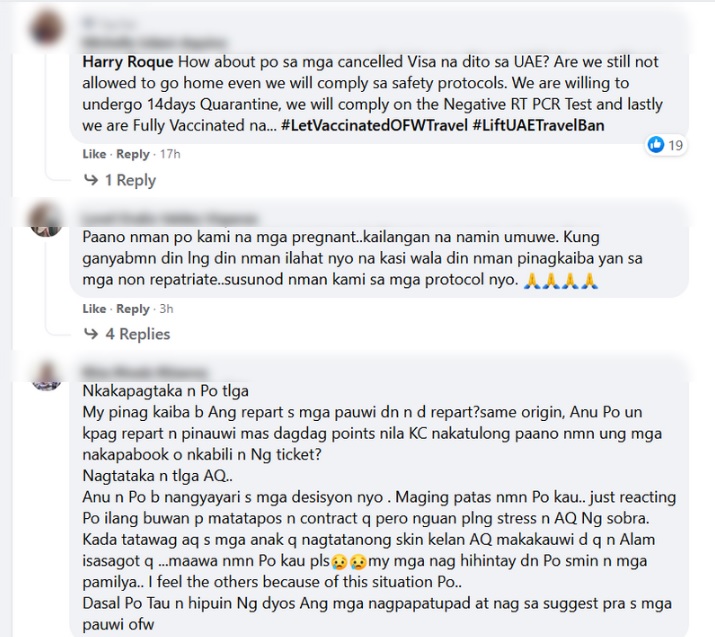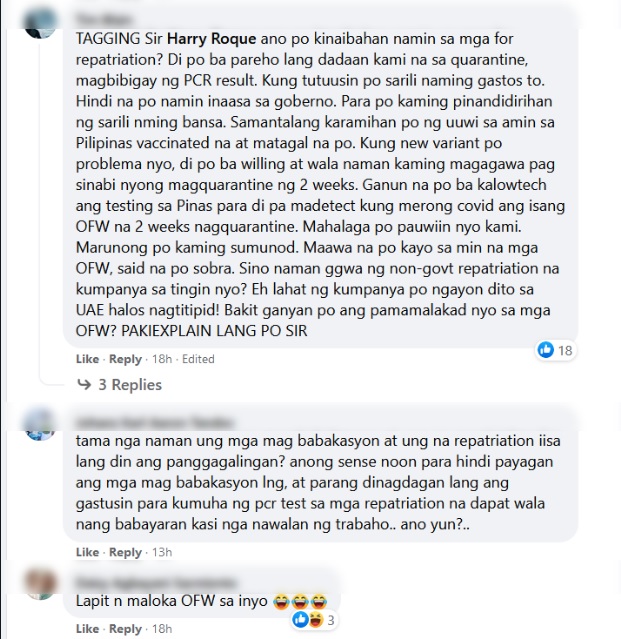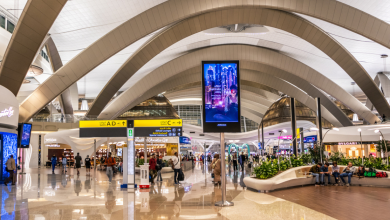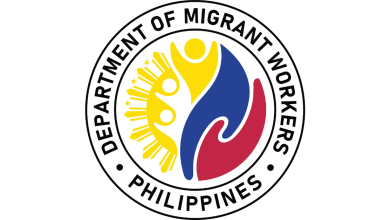Overseas Filipinos in countries affected by the Philippines’ extended travel ban have started to question the reason as to why the government only allowed repatration flights instead of allowing the general overseas Filipino public who wish to head back home to the Philippines.
This, after the Inter Agency Task Force, amended its earlier decision that limits flights heading to the Philippines only to repatriation programs of the Philippine government, as well as repatriations led non-Philippine government organizations, with strict adherence to a 14-day facility-based quarantine.
OFWs said that their fellow OFWs who will be repatriated are coming from the very same countries where the travel ban is currently in place. They questioned why the Philippine government decided to limit the flights back to their home country with such circumstances.
RELATED STORY: OFWs seek IATF’s clarification on the difference between vaccinations in PH and abroad

“May pinagkakaiba ba ang repat sa mga pauwi dni na hindi repat? Same (naman) ang origin. Maging patas naman po kayo, ilang buwan pa matatapos na contract ko pero ngayon pa lang stress na ako nang sobra. Kada tatawag ako sa mga anak ko, nagtatanong skin kailan ako makakauwi – hindi ko na alam ang isasagot ko. Maawa naman po kayo, may mga naghihintay din po sa amin na mga pamilya,” said an OFW mother.
Another OFW explained that whether repatriates or not, everyone will go through the same quarantine process anyway.
“Ano po kinaibahan namin sa mga for repatriation? Di po ba pareho lang dadaan kami na sa quarantine, magbibigay ng PCR result. Kung tutuusin po sarili naming gastos to (sa flight ticket). Hindi na po namin inaasa sa gobyerno. Para po kaming pinandidirihan ng sarili nming bansa. Samantalang karamihan po ng uuwi sa amin sa Pilipinas vaccinated na at matagal na po. Kung new variant po problema nyo, di po ba willing at wala naman kaming magagawa pag sinabi nyong magquarantine ng 2 weeks. Mahalaga po pauwiin nyo kami. Marunong po kaming sumunod. Maawa na po kayo sa min na mga OFW,” said another OFW netizen.
READ ON: Roque clarifies entry of OFWs from countries under travel ban

The Philippine government, through the Overseas Workers Welfare Administration, defines and limits repatriation as “Bringing back of distressed OFWs and human remains.”
This means that OFWs who don’t have the financial capacity or have been severely affected by calamities, political unrest, or other circumstances as deemed by the Philippine government, will be assisted and repatriated back home through OWWA.
“Emergency repatriation is carried out in the event of any political unrest or natural calamities. Workers are accorded with airport assistance, temporary shelter at the OWWA Halfway Home, psycho-social counseling, stress debriefing, and transport services or fares for their onward travel to their respective provinces,” according to OWWA’s official website on its Repatriation Assistance Program: https://owwa.gov.ph/index.php/programs-services/repatriation
Earlier, Presidential Spokesperson Harry Roque released a statement on updates regarding inbound international travel among vaccination Filipinos, as follows:
Meanwhile, the IATF approved the guidelines on inbound international travel to any port of the Philippines of all fully vaccinated individuals who have been inoculated in the Philippines. An individual shall be considered as having been fully vaccinated two or more weeks after receiving the second dose in a 2-dose series, or two or more weeks after receiving a single-dose vaccine.
A fully vaccinated individual must carry his or her vaccination card, which must be verified prior to departure, and must be presented to a Bureau of Quarantine (BOQ) representative for re-verification at the Department of Transportation (DOTr) One-Stop Shop upon arrival in the Philippines.All inbound fully vaccinated individuals shall be required to undergo a 7-day facility-based quarantine upon arrival. The BOQ shall ensure strict symptom monitoring while in the quarantine facility for 7 days.RT-PCR test shall only be done when the individual manifests COVID-19 symptoms within the 7-day quarantine. After completing the 7-day facility-based quarantine, the BOQ shall issue a Quarantine Certificate indicating the individual’s vaccination status.Related to this, the IATF directed the Department of Health (DOH), the Department of Finance, the Department of Trade and Industry, the Department of Foreign Affairs and the National Economic and Development Authority to convene and provide recommendations to further relax testing and quarantine protocols for certain classes of travelers.Meanwhile, apart from the repatriation programs of the Philippine government, the IATF exempted non-Philippine government repatriation efforts to the entry restrictions imposed on travelers from India, Pakistan, Nepal, Sri Lanka, Bangladesh, Oman, and the United Arab Emirates.In case of Philippine government-organized repatriation, the Department of Foreign Affairs and the Overseas Workers Welfare Administration shall conduct prior coordination with each other, and with the DOH-BOQ, DOTr and its One-Stop Shop and the Civil Aviation Authority of the Philippines, and the National Task Force Against COVID-19 Task Group for the Management of Returning Overseas Filipinos, at least 48 hours prior to the departure from the country of origin.In the case of non-Philippine government repatriation, all Filipino repatriates from the countries with travel restrictions must present a negative RT-PCR test result taken within 48 hours prior to boarding the aircraft or vessel. The airline or the shipping line is responsible to check on this requirement. A copy of the negative RT-PCR test result of the repatriate shall be submitted to the BOQ upon arrival in the port of entry in the Philippines.Moreover, prior approval from the BOQ is needed for the entry of flight or vessel carrying Filipino repatriates prior to its movement from point of origin. In this connection, the concerned local manning agency (in the case of seafarers), the Philippine recruitment agency (for land-based workers), or the sponsoring Philippine government agency shall submit an exemption request to the DOH-BOQ, the approval of which is tantamount to IATF’s approval on the repatriation effort.The IATF likewise required all repatriates from countries with travel restrictions in effect to be placed on a strict 14-day facility-based quarantine from the date of arrival in the Philippines, with the date of arrival being the first day.
On another matter, the IATF allowed foreign nationals holding Special Resident Retiree’s Visa to enter the Philippines without the need of an entry exemption document.




